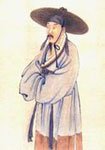“朝冠行即挂神武”的意思及全诗出处和翻译赏析
诗词类型:
《自山中泛舟归郡城》陆游 翻译、赏析和诗意
《自山中泛舟归郡城》是宋代陆游的一首诗。下面是这首诗的中文译文、诗意和赏析:
自山中泛舟归郡城,
I row my small boat from the mountain back to the city,
朝代:宋代,作者:陆游,内容:我呼小艇浮南津,
Dynasty: Song Dynasty, Author: Lu You, Content: I call for my small boat to float on the Nanjin River,
落日乱山衔半轮。
The setting sun tinges the mountains with a half-circle of colors.
背船双鹭低掠水,
Two herons fly low over the water behind my boat,
下滩峭风冷逼人。
On the shore, the cold wind blows fiercely.
中流回望始太息,
In the middle of the river, I turn back and sigh,
烟中白塔高嶙峋。
The white pagoda stands tall and majestic amidst the mist.
适从彼来忽在此,
Just a moment ago, I came from there, and now I'm here,
老夫拄杖捷有神。
This old man, with his staff, moves swiftly and miraculously.
尉曹堆盘笠泽脍,
The officials' banquets and lavish feasts are piled high,
秀才泻榼中山春。
The literati pour out their wine cups, enjoying the spring scenery.
岂惟外物不挂眼,
It's not just the external things that captivate my eyes,
醉后兀尔忘吾身。
Even after getting drunk, I still forget about myself.
朝冠行即挂神武,
Wearing my official hat, I walk with a spirited demeanor,
买犊遂欲耕峨岷。
But when I buy a calf, I desire to plow the lofty Emei Mountain.
金丹自喜日日长,
I take pleasure in the elixir of immortality that prolongs my days,
白发未许年年新。
Yet my white hair reminds me that each year is not renewed.
拥桥炬火远已闹,
The bustling crowd and the distant torches on the bridge,
归舍睡息清而匀。
As I return home, the tranquility and peacefulness lull me to sleep.
明朝笑谓同载客,
Tomorrow morning, I will laugh and say to my fellow passengers,
有脚莫踏东华尘。
If you have feet, do not tread on the dust of Donghua.
诗意和赏析:
这首诗以自然景色为背景,以个人的思考和感悟为主题。诗人在山中划船归城,描绘了落日映照山川的美景,表现了自然景色的壮丽和变化。在船上,他回头望去,看到远处的白塔高耸入云,给人以壮怀激烈的感觉。诗人神秘地描述了自己的神奇之处,似乎在暗示自己的非凡能力和独特的经历。
接下来,诗人描绘了宴会和文人的生活场景,表达了对尘世的疏离和超越。他认为外在的物质享受并不能真正满足内心的追求,只有超脱个人欲望和世俗纷扰,才能找到内心的自由和宁静。
诗的后半部分,诗人以一种戏谑的语气表达了对人生的思考和对岁月的感慨。他穿着官员的帽子,展现出自己的威严,但同时又表达了内心对田园生活的向往。他嘲笑了自己追求长生不死的金丹,却无法逃脱时间的流逝和衰老的现实。最后,诗人回到家中,感受到了归舍的宁静和平和,入眠之前畅想着明天的笑谈。
整首诗通过自然景色的描绘、个人感悟的抒发和对人生的思考,展示了诗人对自然和人生的深刻触动和思考。他通过对景物和自己内心的描绘,表达了对物质欲望的超越和对内心自由的追求,同时也表达了对人生矛盾和无常的思考。整首诗意境优美,抒情深沉,展现了陆游独特的诗境和思想情感。
《自山中泛舟归郡城》陆游 拼音读音参考
zì shān zhōng fàn zhōu guī jùn chéng
自山中泛舟归郡城
wǒ hū xiǎo tǐng fú nán jīn, luò rì luàn shān xián bàn lún.
我呼小艇浮南津,落日乱山衔半轮。
bèi chuán shuāng lù dī lüè shuǐ, xià tān qiào fēng lěng bī rén.
背船双鹭低掠水,下滩峭风冷逼人。
zhōng liú huí wàng shǐ tài xī, yān zhōng bái tǎ gāo lín xún.
中流回望始太息,烟中白塔高嶙峋。
shì cóng bǐ lái hū zài cǐ, lǎo fū zhǔ zhàng jié yǒu shén.
适从彼来忽在此,老夫拄杖捷有神。
wèi cáo duī pán lì zé kuài, xiù cái xiè kē zhōng shān chūn.
尉曹堆盘笠泽脍,秀才泻榼中山春。
qǐ wéi wài wù bù guà yǎn, zuì hòu wù ěr wàng wú shēn.
岂惟外物不挂眼,醉後兀尔忘吾身。
cháo guān xíng jí guà shén wǔ, mǎi dú suì yù gēng é mín.
朝冠行即挂神武,买犊遂欲耕峨岷。
jīn dān zì xǐ rì rì zhǎng, bái fà wèi xǔ nián nián xīn.
金丹自喜日日长,白发未许年年新。
yōng qiáo jù huǒ yuǎn yǐ nào, guī shě shuì xī qīng ér yún.
拥桥炬火远已闹,归舍睡息清而匀。
míng cháo xiào wèi tóng zài kè, yǒu jiǎo mò tà dōng huá chén.
明朝笑谓同载客,有脚莫踏东华尘。
“朝冠行即挂神武”平仄韵脚
拼音:cháo guān xíng jí guà shén wǔ
平仄:平平平平仄平仄
韵脚:(仄韵) 上声七麌
